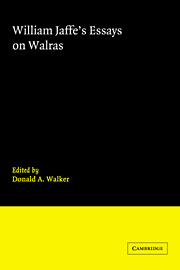Book contents
- Frontmatter
- Contents
- Preface
- Acknowledgments
- Introduction
- PART I WALRAS'S BIOGRAPHY
- PART II THE GENESIS AND DEVELOPMENT OF WALRAS'S IDEAS
- 3 A. N. Isnard, progenitor of the Walrasian general equilibrium model (1969)
- 4 The birth of Léon Walras's Eléments (1977)
- 5 A centenarian on a bicentenarian: Léon Walras's Eléments on Adam Smith's Wealth of Nations (1977)
- 6 Léon Walras and his relations with American economists (1960)
- PART III THE SCOPE OF WALRAS'S WORK
- PART IV SPECIAL TOPICS IN WALRAS'S ECONOMICS
- PART V WALRAS'S PLACE IN THE HISTORY OF ECONOMIC THOUGHT
- Index
5 - A centenarian on a bicentenarian: Léon Walras's Eléments on Adam Smith's Wealth of Nations (1977)
Published online by Cambridge University Press: 05 May 2010
- Frontmatter
- Contents
- Preface
- Acknowledgments
- Introduction
- PART I WALRAS'S BIOGRAPHY
- PART II THE GENESIS AND DEVELOPMENT OF WALRAS'S IDEAS
- 3 A. N. Isnard, progenitor of the Walrasian general equilibrium model (1969)
- 4 The birth of Léon Walras's Eléments (1977)
- 5 A centenarian on a bicentenarian: Léon Walras's Eléments on Adam Smith's Wealth of Nations (1977)
- 6 Léon Walras and his relations with American economists (1960)
- PART III THE SCOPE OF WALRAS'S WORK
- PART IV SPECIAL TOPICS IN WALRAS'S ECONOMICS
- PART V WALRAS'S PLACE IN THE HISTORY OF ECONOMIC THOUGHT
- Index
Summary
This year (1976), with the celebration of centenaries all the rage, the two hundredth anniversary of the Wealth of Nations is being grandly commemorated, as it deserves to be, all over the world. Occasionally it is remembered, here and there, that this year may also be considered the centenary of another outstanding event in the history of economics, the appearance of the first edition of Léon Walras's Eléments d'économie politique pure in 1874–77, just about one hundred years ago. If the Wealth of Nations seems to be taking precedence of the Eléments in the frequency and in the pomp and circumstance of their respective centenary observances, it is indicative of one of two things. Either we have here an instance of falsification of Newton's famous inverse square law of diminishing attraction with distance, since the greater distance from us of the Wealth of Nations apparently lends greater attraction to our view of the work; or the Scots know better than the French how to honour their intellectual forebears.
We may think of Walras's Eléments as a sprightly centenarian, still hobbling about and insinuating itself into all sorts of current economic literature where it persists in playing a living role, much to the dismay of the Marshallians and still more to the dismay of the classical neo-Marxists of Cambridge, England.
- Type
- Chapter
- Information
- William Jaffe's Essays on Walras , pp. 93 - 107Publisher: Cambridge University PressPrint publication year: 1983



